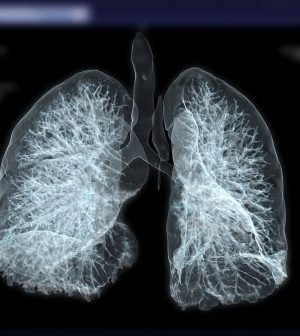- Could Your Grocery Store Meat Be Causing Recurring UTIs?
- Are You Making This Expensive Thermostat Error This Winter?
- Recognizing the Signs of Hypothyroidism
- 10 Strategies to Overcome Insomnia
- Could Artificial Sweeteners Be Aging the Brain Faster?
- Techniques for Soothing Your Nervous System
- Does the Water in Your House Smell Funny? Here’s Why
- Can a Daily Dose of Apple Cider Vinegar Actually Aid Weight Loss?
- 6 Health Beverages That Can Actually Spike Your Blood Sugar
- Treatment Options for Social Anxiety Disorder
Chest CT Scans Can Help Diagnose Pneumonia

Low-dose CT chest scans could help detect pneumonia in at-risk patients while exposing them to small amounts of radiation, a new study says.
Ultra-low-dose scans can effectively detect pneumonia in patients with compromised immune systems, helping doctors treat the infection before it becomes life-threatening, researchers reported in Radiology: Cardiothoracic Imaging.
The scans do so while exposing patients to just 2% of the radiation dose used in a standard CT scan, researchers said.
“This study paves the way for safer, AI-driven imaging that reduces radiation exposure while preserving diagnostic accuracy,” lead researcher Dr. Maximiliano Klug, a radiologist with the Sheba Medical Center in Ramat Gan, Israel, said in a news release.
CT scans are the gold standard for detecting pneumonia, Klug said, but there are concerns regarding the risk posed by repeated exposure to radiation.
Ultra-low-dose CT reduces radiation exposure, but the scans can be grainy and hard to read, researchers said.
To overcome that, Klug’s team developed an AI program that could help “de-noise” low-dose scans, making them sharper and easier to read.
Between September 2020 and December 2022, 54 patients with compromised immune systems who had fevers underwent a pair of chest CT scans — a normal dose scan and an ultra-low-dose scan.
The AI program cleaned up the low-dose scan, and then both sets of images were given to a pair of radiologists for assessment.
Radiologists had 100% accuracy detecting pneumonia and other lung problems with the AI-cleaned low-dose scans, but 91% to 98% accuracy in examining the scans that hadn’t been improved through AI, results show.
“This pilot study identified infection with a fraction of the radiation dose,” Klug said. “This approach could drive larger studies and ultimately reshape clinical guidelines, making denoised ultra-low dose CT the new standard for young immunocompromised patients.”
More information
The Cleveland Clinic has more about pneumonia.
SOURCE: Radiological Society of North America, news release, March 13, 2025
Source: HealthDay
Copyright © 2026 HealthDay. All rights reserved.










